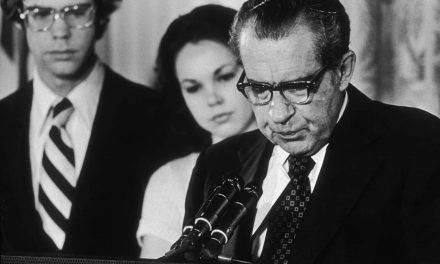
Billionaire business owners deployed lobbyists to make sure Trump’s 2017 tax bill was tailored to their benefit. Confidential IRS records show the windfall that followed was due in large part to assistance from Senator Ron Johnson.
In November 2017, with the administration of President Donald Trump rushing to get a massive tax overhaul through Congress, Senator Ron Johnson stunned his colleagues by announcing he would vote “no.”
Making the rounds on cable TV, the Wisconsin Republican became the first GOP senator to declare his opposition, spooking Senate leaders who were pushing to quickly pass the tax bill with their thin majority. “If they can pass it without me, let them,” Johnson declared.
Johnson’s demand was simple: In exchange for his vote, the bill must sweeten the tax break for a class of companies that are known as pass-throughs, since profits pass through to their owners. Johnson praised such companies as “engines of innovation.” Behind the scenes, the senator pressed top Treasury Department officials on the issue, emails and the officials’ calendars show.
Within two weeks, Johnson’s ultimatum produced results. Trump personally called the senator to beg for his support, and the bill’s authors fattened the tax cut for these businesses. Johnson flipped to a “yes” and claimed credit for the change. The bill passed.
The Trump administration championed the pass-through provision as tax relief for “small businesses.”
Confidential tax records, however, reveal that Johnson’s last-minute maneuver benefited two families more than almost any others in the country — both worth billions and both among the senator’s biggest donors.
Dick and Liz Uihlein of packaging giant Uline, along with roofing magnate Diane Hendricks, together had contributed around $20 million to groups backing Johnson’s 2016 reelection campaign.
The expanded tax break Johnson muscled through netted them $215 million in deductions in 2018 alone, drastically reducing the income they owed taxes on. At that rate, the cut could deliver more than half a billion in tax savings for Hendricks and the Uihleins over its eight-year life.
But the tax break did more than just give a lucrative, and legal, perk to Johnson’s donors. In the first year after Trump signed the legislation, just 82 ultrawealthy households collectively walked away with more than $1 billion in total savings, an analysis of confidential tax records shows. Republican and Democratic tycoons alike saw their tax bills chopped by tens of millions, among them: media magnate and former Democratic presidential candidate Michael Bloomberg; the Bechtel family, owners of the engineering firm that bears their name; and the heirs of the late Houston pipeline billionaire Dan Duncan.
Usually the scale of the riches doled out by opaque tax legislation — and the beneficiaries — remain shielded from the public. A trove of IRS records covering thousands of the wealthiest Americans enabled reporters this year to explore the diverse menu of options the tax code affords the ultrawealthy to avoid paying taxes.
The drafting of the Trump law offers a unique opportunity to examine how the billionaire class is able to shape the code to its advantage, building in new ways to sidestep taxes.
The Tax Cuts and Jobs Act was the biggest rewrite of the code in decades and arguably the most consequential legislative achievement of the one-term president. Crafted largely in secret by a handful of Trump administration officials and members of Congress, the bill was rushed through the legislative process.
As draft language of the bill made its way through Congress, lawmakers friendly to billionaires and their lobbyists were able to nip and tuck and stretch the bill to accommodate a variety of special groups. The flurry of midnight deals and last-minute insertions of language resulted in a vast redistribution of wealth into the pockets of a select set of families, siphoning away billions in tax revenue from the nation’s coffers. This story is based on lobbying and campaign finance disclosures, Treasury Department emails and calendars obtained through a Freedom of Information Act lawsuit, and confidential tax records.
For those who benefited from the bill’s modifications, the collective millions spent on campaign donations and lobbying were minuscule compared with locking in years of enormous tax savings.
A spokesperson for the Uihleins declined to comment. Representatives for Hendricks didn’t respond to questions. In response to emailed questions, Johnson did not address whether he had discussed the expanded tax break with Hendricks or the Uihleins. Instead, he wrote in a statement that his advocacy was driven by his belief that the tax code “needs to be simplified and rationalized.”
“My support for ‘pass-through’ entities — that represent over 90% of all businesses — was guided by the necessity to keep them competitive with C-corporations and had nothing to do with any donor or discussions with them,” he wrote.
By the summer of 2017, it was clear that Trump’s first major legislative initiative, to “repeal and replace” Obamacare, had gone up in flames, taking a marquee campaign promise with it. Looking for a win, the administration turned to tax reform.
“Getting closer and closer on the Tax Cut Bill. Shaping up even better than projected,” Trump tweeted. “House and Senate working very hard and smart. End result will be not only important, but SPECIAL!”
At the top of the Republican wishlist was a deep tax cut for corporations. There was little doubt that such a cut would make it into the final legislation. But because of the complexity of the tax code, slashing the corporate tax rate doesn’t actually affect most U.S. businesses.
Corporate taxes are paid by what are known in tax lingo as C corporations, which include large publicly traded firms like AT&T or Coca-Cola. Most businesses in the United States aren’t C corporations, they’re pass-throughs. The name comes from the fact that when one of these businesses makes money, the profits are not subject to corporate taxes. Instead, they “pass through” directly to the owners, who pay taxes on the profits on their personal returns. Unlike major shareholders in companies like Amazon, who can avoid taking income by not selling their stock, owners of successful pass-throughs typically can’t avoid it.
Pass-throughs include the full gamut of American business, from small barbershops to law firms to, in the case of Uline, a packaging distributor with thousands of employees.
So alongside the corporate rate cut for the AT&Ts of the world, the Trump tax bill included a separate tax break for pass-through companies. For budgetary reasons, the tax break is not permanent, sunsetting after eight years.
Proponents touted it as boosting “small business” and “Main Street,” and it’s true that many small businesses got a modest tax break. But a recent study by Treasury economists found that the top 1% of Americans by income have reaped nearly 60% of the billions in tax savings created by the provision. And most of that amount went to the top 0.1%. That’s because even though there are many small pass-through businesses, most of the pass-through profits in the country flow to the wealthy owners of a limited group of large companies.
Tax records show that in 2018, Bloomberg, whom Forbes ranks as the 20th wealthiest person in the world, got the largest known deduction from the new provision, slashing his tax bill by nearly $68 million. (When he briefly ran for president in 2020, Bloomberg’s tax plan proposed ending the deduction, though his plan was generally friendlier to the wealthy than those of his rivals.) A spokesperson for Bloomberg declined to comment.
Johnson’s intervention in November 2017 was designed to boost the bill’s already generous tax break for pass-through companies. The bill had allowed for business owners to deduct up to 17.4% of their profits. Thanks to Johnson holding out, that figure was ultimately boosted to 20%.
That might seem like a small increase, but even a few extra percentage points can translate into tens of millions of dollars in extra deductions in one year alone for an ultrawealthy family.
The mechanics are complicated but, for the rich, it generally means that a business owner gets to keep an extra 7 cents on every dollar of profit. To understand the windfall, take the case of the Uihlein family.
Dick, the great-grandson of a beer magnate, and his wife, Liz, own and operate packaging giant Uline. The logo of the Pleasant Prairie, Wisconsin, firm is stamped on the bottom of countless paper bags. Uline produced nearly $1 billion in profits in 2018, according to an analysis of tax records. Dick and Liz Uihlein, who own a majority of the company, reported more than $700 million in income that year. But they were able to slash what they owed the IRS with a $118 million deduction generated by the new tax break.
Liz Uihlein, who serves as president of Uline, has criticized high taxes in her company newsletter. The year before the tax overhaul, the couple gave generously to support Trump’s 2016 presidential campaign. That same year, when Johnson faced long odds in his reelection bid against former Senator Russ Feingold, the Uihleins gave more than $8 million to a series of political committees that blanketed the state with pro-Johnson and anti-Feingold ads. That media blitz led to the nickname “the Koch brothers of Wisconsin politics” for the Uihleins.
Johnson’s campaign also got a boost from Hendricks, Wisconsin’s richest woman and owner of roofing wholesaler ABC Supply Co. The Beloit-based billionaire has publicly pushed for tax breaks and said she wants to stop the U.S. from becoming “a socialistic ideological nation.”
Hendricks has said Johnson won her over after she grilled him at a brunch meeting six years earlier. She gave about $12 million to a pair of political committees, the Reform America Fund and the Freedom Partners Action Fund, that bought ads attacking Feingold.
In the first year of the pass-through tax break, Hendricks got a $97 million deduction on income of $502 million. By reducing the income she owed taxes on, that deduction saved her around $36 million.
Justіn Еllіоtt and Rоbеrt Fаturechі
Lіsа Lаrsоn-Wаlkеr
Originally published on ProPublica.org as Secret IRS Files Reveal How Much the Ultrawealthy Gained by Shaping Trump’s “Big, Beautiful Tax Cut”
The best way to combat #fakenews is by supporting real news. Donate today to be among the tens of thousands of ProPublicans powering tomorrow’s stories.














